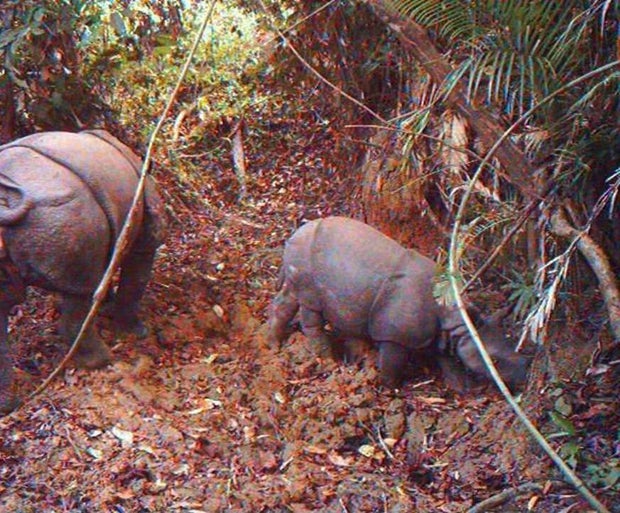Indonesian authorities said Wednesday that they have arrested six people as suspects in an international rhino poaching ring that wildlife advocates believe could threaten the existence of the species. The poaching ring targets the critically endangered Javan rhinoceros, one of five species of rhino that has a dwindling population of just 76, according to the conservation charity organization Save the Rhino, which is based in the United Kingdom and focuses on protecting rhinos from poaching in Africa and Asia.
The suspects recently arrested in Indonesia are part of a network that used homemade firearms to kill at least 26 Javan rhinos since 2018 to get their horns. The horns are in high demand in Asia where they’re predominantly used in traditional Chinese medicine and increasingly for making ornaments, said Banten provincial police chief Abdul Karim.
He said the six men were arrested in a joint operation by police and the Forestry and Environment Ministry last month. Yudhis Wibisana, the director of criminal investigation in Banten, told reporters this week that one of the suspects “admitted that 22 animals had been killed and their horns sold” and another “admitted four animals had been killed,” according to AFP.
Police and a team of rangers from Banten’s Ujung Kulon National Park were searching for eight other members of the syndicate, officials said. One of the leaders of the poaching syndicate, Sunendi, was arrested last year and sentenced to 12 years in prison and a 100-million rupiah fine, which equates to $6,135.
Business Wire via AP
Karim said an investigation found that Sunendi, who uses a single name like many Indonesians, and nine others had killed 22 Javan rhinos since 2018, while another group had killed four more since 2021. They sold the horns to Chinese buyers through a local handler, who is currently on trial.
Police seized homemade firearms, bullets, gun powder, a steel sling noose and other equipment used to poach rhinos.
Rasio Ridho Sani, the head of law enforcement at the Forestry and Environment Ministry, said the population of the Javan rhino is declining and gave an estimate similar to Save the Rhino’s, telling The Associated Press that only about 80 mature animals remain. He said they are found mostly in the Ujung Kulon National Park in the western part of Indonesia’s main Java island. Javan rhinos are threatened by the destruction of tropical forest habitat and poachers, he said.
“Poaching of protected animals is a serious crime and is of international concern,” Sani said. “We are working closely with the Banten Regional Police to search and arrest the perpetrators of animal poaching crimes who managed to escape during the operation.”
Jo Shaw, the chief executive officer at Save the Rhino, responded to the poaching suspects’ arrests in a statement that underscored the extent to which poachers have depleted the overall population of Javan rhinos in just a few years.
“It’s devastating to learn that criminal gangs claim to have killed one-third of the entire remaining Javan rhino population, bringing the future of the species into jeopardy,” Shaw said in the statement. “Arrests of members of the poaching networks around Ujung Kulon National Park are a positive development, however, it is essential that they are prosecuted to the full extent of the law and that agencies collaborate in investigating and dismantling the networks responsible for transporting the rhino horns onto the black market in China.”
AFP contributed to this report.


